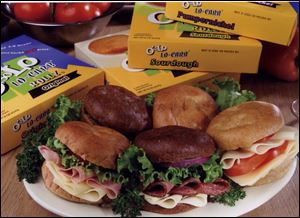
Food labels can teach a lot
3/25/2003
O'So Lo Lo-Carb Sandwich Rollz.
Reading food labels helps consumers make informed decisions. Beyond the name and description of products, read Nutrition Facts.
I have two packages of bread on my desk that I've been analyzing. (When you read labels, you also need to know the nutrition facts on a standard loaf of bread or bag of rolls for comparison.) One product is a low-carbohydrate sandwich roll marketed as the answer to a low-carb dieter's prayer. The other is a loaf made from sprouted grain, “not flour.”
Products such as O'So Lo Foods Sandwich Rollz and Muffins appeal to those on high-protein, low-carbohydrate diets. While O'So Lo Rollz contain only 3 grams of carbohydrates apiece, compared to the standard sandwich roll's 21 grams, each O'So Lo roll has 9 grams of fat and 170 calories. (Standard sandwich rolls each contain about 1.5 grams of fat and 110 calories.)
Major ingredients in O'So Lo Rollz are water, gluten, flaxseed, canola oil, vegetable fiber, inulin (a dough ingredient), and yeast. Flaxseed contains fiber and is a rich source of omega-3 fatty acids. When ground into flour and mixed with a liquid, it produces a texture similar to egg whites, and can be used in place of eggs to add body to baked goods.
Those on low-carb, high-protein diets are looking for ways to include moderate carbohydrates. The 1990s was the heyday of the low-fat movement when low-fat cakes, cookies, and desserts flooded the market. It didn't help reduce the bulging waistline of America. Obesity was on the rise. Now, low-carb products and cookbooks are popular for those on the high-protein diets.
(Note that in April, 2002, the American Kidney Fund released research results that indicate high-protein diets strain the kidneys. High-protein diets may also increase the risk of arteriosclerosis. Higher-carb diets provide more vitamins A, C, carotene, and folate, and more calcium, magnesium, and iron than low-carb diets, according to Chow Line, an Ohio State University publication.)
Also on my desk is a loaf of Sprouted Grain Bread trademarked Ezekiel 4:9. Inspired by the scripture, the organic bread is made from wheat, barley, beans, lentils, millet, and spelt. There are even Sprouted Grain Tortillas, described as “100 percent flourless, high fiber, complete protein.”
This bread is sold at stores around town in the frozen-food case. It's hearty and reminiscent of German breads.
According to information from the Food for Life Baking Co. in Corona, Calif., which makes the bread, sprouted grain bread uses the entire sprout, retaining essential vitamins, minerals, bran, and fiber. The freshly sprouted live grains are slowly mashed and mixed into dough in small batches and slowly baked into bread.
The benefits of sprouted grain are fiber. Each slice of Ezekiel 4:9 has 80 calories, 0.5 grams of fat, and 15 grams of carbohydrates.
Those descriptive food labels sound good, but it's what's in the Nutrition Facts that counts.